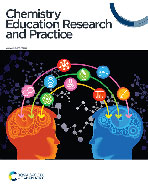Effects of a context-based approach with prediction–observation–explanation on conceptual understanding of the states of matter, heat and temperature†
Abstract
The main purpose of this study was to investigate the effect of the Context-Based Approach (CBA) enriched by Prediction–Observation–Explanation (POE) on 5th grade students’ conceptual understanding of the States of Matter, Heat and Temperature. In this study, quantitative and qualitative data collection methods were employed. The quantitative element used a quasi-experimental design involving a non-equivalent pretest–posttest control group. This research was performed with a total number of 38 (N control group = 18, N experimental group = 20) 5th grade students (aged 10 to 11 years) in a school in a village located in the East Blacksea region in the 2016–2017 academic year. In the study, a two-tier concept questionnaire entitled ‘the States of Matter, Heat and Temperature (SMHTQ)’ and a semi-structured interview were used as data collection tools. In the experimental group, the topics were taught using the CBA enriched with the POE strategy while in the control group the topics were taught using the 5E teaching model (Engage–Explore–Explain–Elaborate–Evaluate) of the constructivist approach. The results indicated that the CBA enriched with the POE strategy was more effective in improving students’ conceptual understanding and reducing students’ alternative concepts than the 5E teaching model on the States of Matter, Heat and Temperature concepts. The results of the study provided helpful information for science teachers and researchers in science/chemistry education since the teaching materials used enriched the learning environment. Similar studies can be applied to different and wider sample groups and concepts.


 Please wait while we load your content...
Please wait while we load your content...